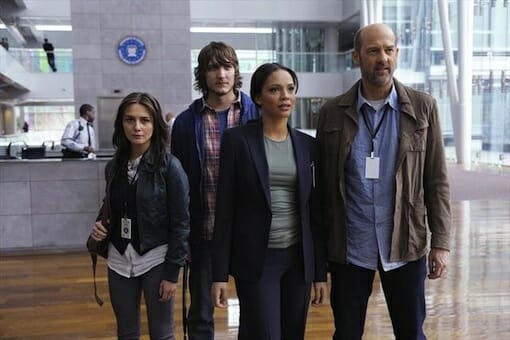By Becky Kifer · February 17, 2013

This is going to seem about as cheerful as Tommy Lee Jones at the Golden Globes, but I can’t come up with a clever means to articulate all the ways in which the first episode of ABC’s Zero Hour was bad. Frankly, I’m not sure it’s even worth the time to look up other synonyms. Sometimes it’s just the way things are: a bad pilot is a bad pilot is a bad pilot.
I’ve spent an hour trying to write a pithy opening statement about the new series and it’s only reduced me to bluntness. Zero Hour killed my snark. That should be the show’s greatest secret; how one episode can leave someone so gobsmacked they’re unable to accomplish the one thing on Earth they were born to do. Maybe it’s a little crusty and unforgiving, but I was DVR-less and had to sit through commercials. I am entitled to saltiness.
Zero Hour, developed by Prison Break creator Paul Scheuring, took the sometimes intriguing, sometimes whathuh? sidestory from J.J. Abrams’ Alias and tried to turn it into a television show where ER alumnus Anthony Edwards whines a lot and travels to the Arctic Circle. Instead of cribbing the other positive elements of its ABC predecessor—fun frivolities, unique characters, delightful emotional manipulation—Zero Hour is a dour copy with less mystery than my Alias Rambaldi series box set. (Pssst: The extra disc is hidden under a false bottom.)
Magazine editor Hank Galliston (Edwards) finds himself drawn into a conspiracy theory to end all conspiracies when his wife Laila (Jacinda Barrett) is kidnapped by a high-profile mercenary (Michael Nyqvist) just hours after she buys a mysterious clock. Together with two of his young reporters, Hank begins to investigate Laila’s disappearance, uncovering a hidden map inside the clock. Tracked by a dogged FBI agent named Riley (Carmen Ejogo), Hank heads toward what he believes to be a place called New Bartholomew. Little does Hank know, New Bartholomew isn’t a place but a person; one of 12 new Biblical apostles created during WWII to stop a coming catastrophe.
There’s a lot going on in Zero Hour, and next to none of it makes much sense. Nazis and white-irised villains and a time-travel-reincarnation-cloning subplot that gets more and more muddled the longer it goes on. (In the words of Doctor Who: it’s all very timey-wimey, spacey-wacey.) Bad television is not a crime. Dumb television should be punishable by a Games of Thrones style rat-bucket. Bad is fun; dumb is repurposing a Sorkin-ian “intellectual reach-around” line and vaguely identifying the MacGuffin-plot device as “that thing.”
Oh, stupid lines, how do I count thee? Whether it’s Riley eloquently telling Hank about her tragic past—“Maybe you see a social counselor; an ex-social councilor that would like nothing better than to be a social counselor again.”—or Hank proclaiming “He can’t see me!” when it’s very obvious that, no, the bad guy cannot see him. The best is when Laila, bickering over hot dogs while strolling through a yard sale in the middle of a Brooklyn pier, tells her husband that, “You’re never going to lose me, Hank Galliston, no matter how hard you try.” And then he loses her. Nailed the dramatic foreshadowing, Zero Hour.
Besides dialogue that could have been typed by my fan fiction-writing pre-teen self, Zero Hour is begat with lazy plotting and bad location planning. Why wouldn’t you have the hush-hush handoff of a valuable item directly outside of FBI headquarters? (Obviously no sinister international mercenary would ever be foolish enough to watch you in a public place.) Why does a character in a parked car reveal she knows what to do, only to pause the conversation long enough so the group can drive several miles across town, and then finish her epiphany? (It’s so dumb it actually hurts.)
Toward the end of the episode, as Hank explores a Nazi submarine in the Arctic (because why not?), his padawan reporters track down an old clockmaker who tells them all about the new apostles and Zero Hour, a coming storm that will “pit science against religion” and “country against country” and pull the entire world into the conflict. I’m pretty sure in the land of 2013 we call that a Tuesday.
Scheuring’s Prison Break, at least before it actually achieved the title’s promise in the second season, was a clever and creepy caper. He’s pulled none of those elements into Zero Hour. Neither Edwards nor Nyqvist (of the original The Girl With The Dragon Tattoo fame) deserve the words that their characters are saying—nor do they do much work to elevate it, either. As a kidnap victim, it’s hard to care for poor, hot dog addicted Laila. Perhaps if they’d made a bigger issue of the very obvious Knowing Look and Covert Nod shared between her and the clock vendor at the pier. Given the lack of subtly in that moment, they might as well have performed a Community-esque secret handshake.
Zero Hour could go anywhere from here. Nazi experiments, magical clocks, reincarnated apostles—it’s a smorgasbord of ridiculousness. Given that the doomed religious order sure looked to be pulling a very cross-like item from the German sewage tunnels, is there a literal Deus ex machina waiting in the wings? Do we get to meet Zombie Jesus too? With so much absurd plotting and thoughtlessness to look forward to, who knows? Maybe Zero Hour isn’t so bad after all.